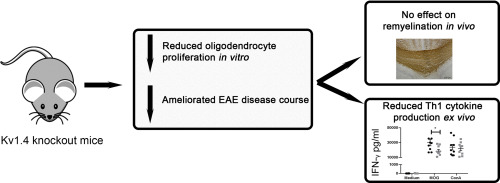当前位置:
X-MOL 学术
›
J. Neuroimmunol.
›
论文详情
Our official English website, www.x-mol.net, welcomes your
feedback! (Note: you will need to create a separate account there.)
Functional role of endogenous Kv1.4 in experimental demyelination
Journal of Neuroimmunology ( IF 2.9 ) Pub Date : 2020-06-01 , DOI: 10.1016/j.jneuroim.2020.577227 María Nazareth González-Alvarado 1 , Caroline Rötger 2 , Laura Berger 2 , Barry London 3 , Stefanie Haase 4 , Kristina Kuhbandner 2 , De-Hyung Lee 4 , Ralf A Linker 4
Journal of Neuroimmunology ( IF 2.9 ) Pub Date : 2020-06-01 , DOI: 10.1016/j.jneuroim.2020.577227 María Nazareth González-Alvarado 1 , Caroline Rötger 2 , Laura Berger 2 , Barry London 3 , Stefanie Haase 4 , Kristina Kuhbandner 2 , De-Hyung Lee 4 , Ralf A Linker 4
Affiliation

|
During neuroinflammation, the shaker type potassium channel Kv1.4 is re-expressed in oligodendrocytes (Ol), but not immune cells. Here, we analyze the role of endogenous Kv1.4 in two demyelinating animal models of multiple sclerosis. While Kv1.4 deficiency in primary murine Ol led to a decreased proliferation rate in vitro, it did not exert an effect on Ol proliferation or on the extent of de- or remyelination in the cuprizone model in vivo. However, in experimental autoimmune encephalomyelitis, Kv1.4-/- mice exhibited a milder disease course and reduced Th1 responses. These data argue for an indirect effect of Kv1.4 on immune cells, possibly via glial cells.
中文翻译:

内源性 Kv1.4 在实验性脱髓鞘中的功能作用
在神经炎症期间,摇床型钾通道 Kv1.4 在少突胶质细胞 (O1) 中重新表达,但在免疫细胞中不表达。在这里,我们分析了内源性 Kv1.4 在多发性硬化症的两个脱髓鞘动物模型中的作用。虽然原代鼠 Ol 中 Kv1.4 缺陷导致体外增殖率降低,但它对 体内 铜宗模型中的 Ol 增殖或脱髓鞘或髓鞘再生的程度没有影响。然而,在实验性自身免疫性脑脊髓炎中,Kv1.4-/- 小鼠表现出较轻的病程和降低的 Th1 反应。这些数据表明 Kv1.4 可能通过神经胶质细胞对免疫细胞产生间接影响。
更新日期:2020-06-01
中文翻译:

内源性 Kv1.4 在实验性脱髓鞘中的功能作用
在神经炎症期间,摇床型钾通道 Kv1.4 在少突胶质细胞 (O1) 中重新表达,但在免疫细胞中不表达。在这里,我们分析了内源性 Kv1.4 在多发性硬化症的两个脱髓鞘动物模型中的作用。虽然原代鼠 Ol 中 Kv1.4 缺陷导致体外增殖率降低,但它对 体内 铜宗模型中的 Ol 增殖或脱髓鞘或髓鞘再生的程度没有影响。然而,在实验性自身免疫性脑脊髓炎中,Kv1.4-/- 小鼠表现出较轻的病程和降低的 Th1 反应。这些数据表明 Kv1.4 可能通过神经胶质细胞对免疫细胞产生间接影响。











































 京公网安备 11010802027423号
京公网安备 11010802027423号